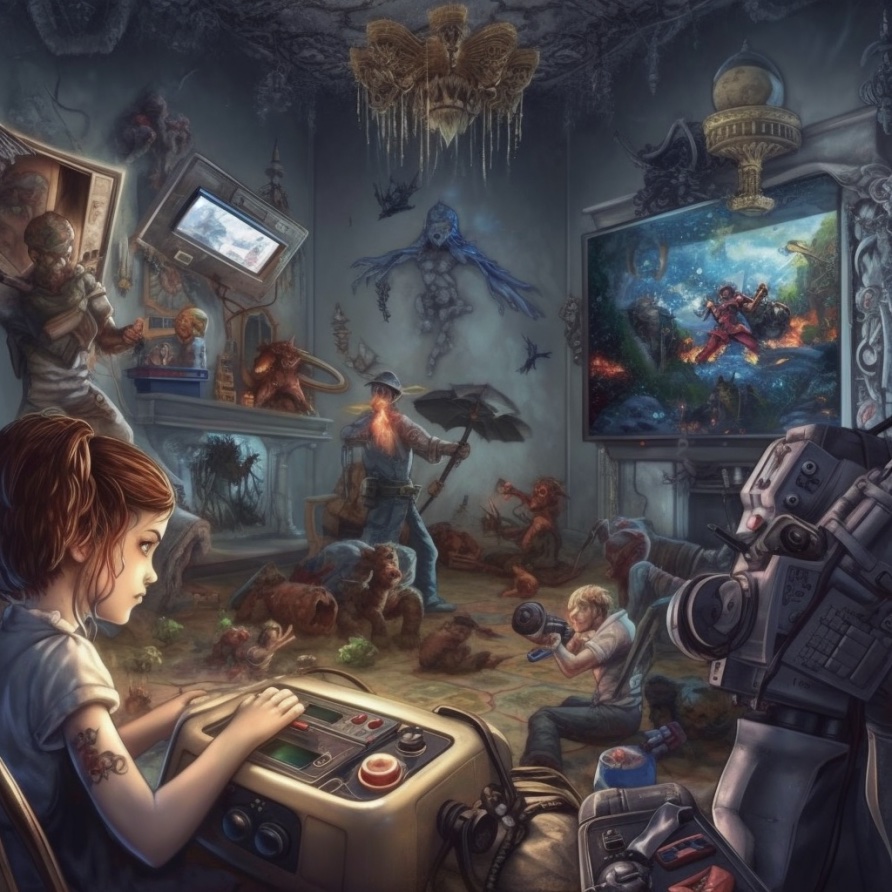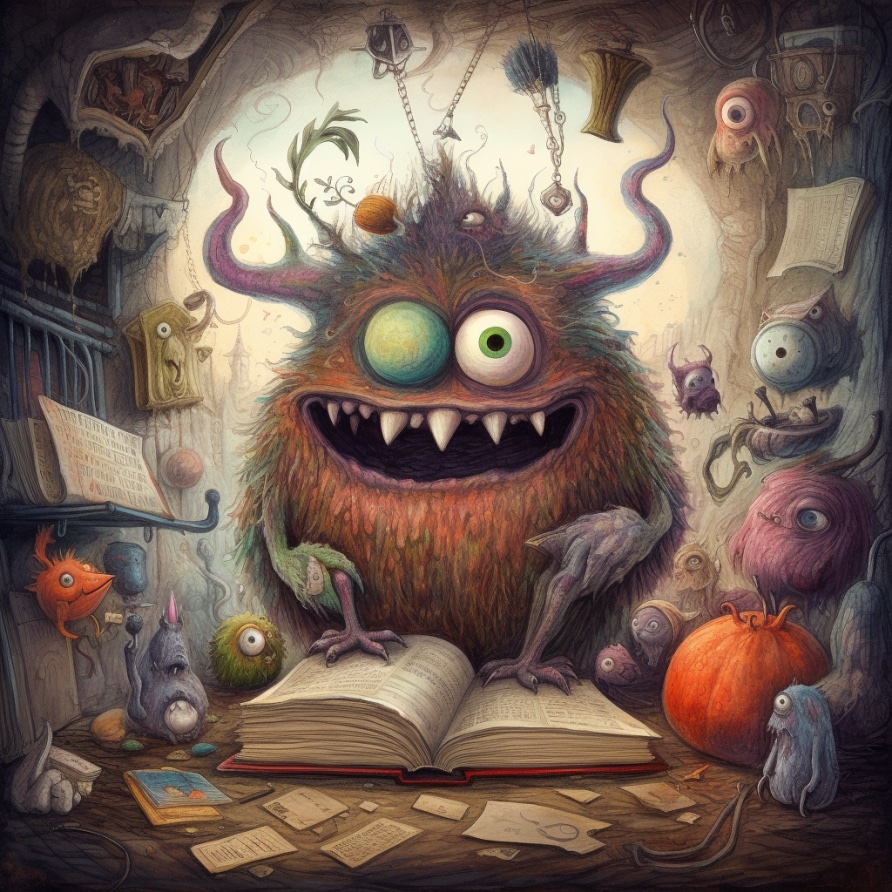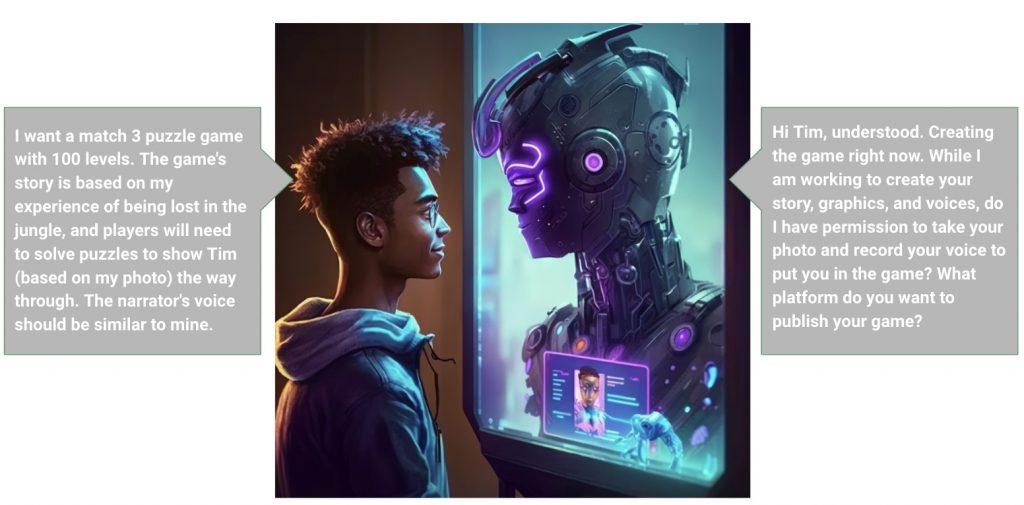Created with the help of ChatGPT
→ If you like this content, follow me on Twitter for more ChatGPT ideas
Disclaimer
→ This article is prepared for educational purposes only, with the help of ChatGPT itself, and shouldn’t be considered as advice of any kind. Do your own research and consult with experts before starting a business!
The ideas in this list have not been ranked in order of importance and they have all been considered to be of equal significance.
1. Creating a customer service chatbot for e-commerce websites
This idea involves using the ChatGPT API to build a chatbot that can interact with customers on an e-commerce website, answering their questions and helping them with their purchase. The chatbot could be integrated into the website through a chat interface, and could be programmed to answer common questions about the products, shipping and returns, and account management. The target customers for this business would be e-commerce businesses of any size, who want to improve the customer service experience on their website. To build this business, someone would need experience in software development and knowledge of e-commerce websites. They would also need to have experience with natural language processing and machine learning to properly train the chatbot. To obtain clients, the business could reach out to e-commerce companies directly, or market the service through digital advertising and industry events.
2. Developing a virtual personal shopping assistant for retail stores
This idea involves using the ChatGPT API to build a chatbot that can assist customers with their shopping in a physical retail store. The chatbot could be integrated into a mobile application, that customers can use to communicate with the chatbot to find products, get recommendations, and make purchase. The target customers for this business would be retail stores, who want to improve customer engagement and sales by providing a unique shopping experience. To build this business, someone would need experience in software development and knowledge of mobile application development, natural language processing and machine learning to properly train the chatbot. Additionally, they need to have experience in retail business to understand how to properly recommend and make suggestions to customers. To obtain clients, the business could reach out to retail companies directly, or market the service through digital advertising and industry events.
3. Building a virtual HR assistant for recruiting and onboarding new employees
This idea involves using the ChatGPT API to build a chatbot that can assist with recruiting and onboarding new employees at a company. The chatbot could be integrated into the company’s website or a messaging platform, and could be programmed to answer common questions about the job application process, company culture, and benefits. The target customers for this business would be companies of any size, who want to improve the efficiency and cost-effectiveness of their recruitment and onboarding process. To build this business, someone would need experience in software development, as well as knowledge of HR processes and best practices. They would also need to have experience with natural language processing and machine learning to properly train the chatbot. To obtain clients, the business could reach out to companies directly, or market the service through digital advertising and industry events.
4. Designing a virtual financial advisor for personal budgeting and investment advice
This idea involves using the ChatGPT API to build a chatbot that can provide personalized financial advice to individuals. The chatbot could be integrated into a mobile application, and could be programmed to provide advice on budgeting, saving, investing, and managing debt. The target customers for this business would be individuals, who want to improve their financial literacy and make better financial decisions. To build this business, someone would need experience in software development and knowledge of personal finance. They would also need to have experience with natural language processing and machine learning to properly train the chatbot. To obtain clients, the business could reach out to financial institutions and fintech companies directly, or market the service through digital advertising and industry events.
5. Developing a chatbot for mental health support and counseling
This idea involves using the ChatGPT API to build a chatbot that can provide support and counseling for individuals who may be struggling with mental health issues. The chatbot could be integrated into a website or a mobile application, and could be programmed to provide guidance and referrals for professional help, as well as offer self-help tools such as journaling and mindfulness exercises. The target customers for this business would be individuals who are struggling with mental health issues, as well as organizations such as schools, companies, and healthcare providers that want to provide support to their staff or students. To build this business, someone would need to have expertise in the field of mental health and knowledge of best practices for providing support, in addition to experience in software development, natural language processing and machine learning. To obtain clients, the business could reach out to mental health organizations, schools, and companies directly or market the service through digital advertising and industry events.
6. Creating a virtual travel agent to help plan and book vacations
This idea involves using the ChatGPT API to build a chatbot that can assist individuals with planning and booking their vacations. The chatbot could be integrated into a website or a mobile application, and could be programmed to provide information about destinations, recommend accommodations, and assist with booking flights, hotels, and activities. The target customers for this business would be individuals who want to plan and book their own vacations. To build this business, someone would need experience in software development and knowledge of the travel industry. They would also need to have experience with natural language processing and machine learning to properly train the chatbot. To obtain clients, the business could market the service through digital advertising and industry events, or partner with travel agencies.
7. Building a chatbot for language learning and translation services
This idea involves using the ChatGPT API to build a chatbot that can assist individuals with learning a new language, or translating from one language to another. The chatbot could be integrated into a website or a mobile application, and could be programmed to provide language lessons, vocabulary lists, and translation services. The target customers for this business would be individuals who want to learn a new language, or businesses and organizations that need translation services. To build this business, someone would need experience in software development and knowledge of language learning and translation. They would also need to have experience with natural language processing and machine learning to properly train the chatbot. To obtain clients, the business could market the service through digital advertising and industry events, or partner with language schools and translation agencies.
8. Developing a virtual health coach to assist with exercise and nutrition plans
This idea involves using the ChatGPT API to build a chatbot that can assist individuals with developing and sticking to exercise and nutrition plans. The chatbot could be integrated into a website or a mobile application, and could be programmed to provide personalized recommendations, track progress, and offer motivation and support. The target customers for this business would be individuals who want to improve their physical health. To build this business, someone would need experience in software development, as well as knowledge of exercise and nutrition. They would also need to have experience with natural language processing and machine learning to properly train the chatbot. To obtain clients, the business could market the service through digital advertising and industry events or partner with fitness centers, gyms, and personal trainers.
9. Designing a virtual legal advisor for providing general legal advice
This idea involves using the ChatGPT API to build a chatbot that can provide general legal advice to individuals. The chatbot could be integrated into a website, and could be programmed to provide advice on a variety of legal topics, such as contract review, dispute resolution, and basic legal questions. The target customers for this business would be individuals and small businesses who need legal advice but can’t afford or don’t need a lawyer. To build this business, someone would need experience in software development, as well as knowledge of law. They would also need to have experience with natural language processing and machine learning to properly train the chatbot. To obtain clients, the business could market the service through digital advertising, and also through law firms, legal resource centers and legal aid organizations.
10. Creating a virtual event planning assistant to help plan and organize events
This idea involves using the ChatGPT API to build a chatbot that can assist individuals and organizations with planning and organizing events. The chatbot could be integrated into a website or a mobile application, and could be programmed to provide recommendations for venues, vendors, and entertainment, as well as assist with scheduling, budgeting, and sending invitations. The target customers for this business would be individuals planning events such as parties and weddings, as well as organizations planning events such as corporate meetings and conferences. To build this business, someone would need experience in software development, as well as knowledge of event planning. They would also need to have experience with natural language processing and machine learning to properly train the chatbot. To obtain clients, the business could market the service through digital advertising, and also through event planning agencies and wedding planners.
11. Building a virtual real estate agent to assist with buying and selling property
This idea involves using the ChatGPT API to build a chatbot that can assist individuals and organizations with buying and selling property. The chatbot could be integrated into a website or a mobile application, and could be programmed to provide information about properties for sale, assist with scheduling viewings, and help with the negotiation and closing process. The target customers for this business would be individuals and organizations looking to buy or sell property. To build this business, someone would need experience in software development and knowledge of real estate. They would also need to have experience with natural language processing and machine learning to properly train the chatbot. To obtain clients, the business could market the service through digital advertising and industry events, or partner with real estate agencies and brokerages.
12. Building a virtual invoicing and billing assistant
Create a virtual invoicing and billing assistant that uses the ChatGPT API to help SMBs and enterprises with tasks such as invoice generation, payment tracking and billing management. The assistant would use natural language processing to understand and respond to user inputs, and could be integrated with invoicing and accounting software. The target customers for this business would be SMBs and enterprises looking for a more efficient and cost-effective way to handle invoicing and billing. To build this business, someone would need experience in software development, as well as knowledge of accounting and financial management. They would also need experience with natural language processing and machine learning to properly train the model. To obtain clients, the business could market the service through digital advertising and social media platforms, or by targeting accounting and financial management firms and companies in specific industries.
13. Building a virtual HR performance review tool
Create a virtual HR performance review tool that uses the ChatGPT API to help SMBs and enterprises with tasks such as employee performance evaluation, feedback generation, and goal setting. The tool would use natural language processing to understand and respond to user inputs, and could be integrated with HR management software. The target customers for this business would be SMBs and enterprises looking for a more efficient and cost-effective way to handle HR performance review. To build this business, someone would need experience in software development, as well as knowledge of HR management and employee performance evaluation. They would also need experience with natural language processing and machine learning to properly train the model. To obtain clients, the business could market the service through digital advertising and social media platforms, or by targeting HR management firms and companies in specific industries.
14. Building a virtual supply chain management assistant
Create a virtual supply chain management assistant that uses the ChatGPT API to help SMBs and enterprises with tasks such as inventory management, order tracking and logistics coordination. The assistant would use natural language processing to understand and respond to user inputs, and could be integrated with supply chain management software. The target customers for this business would be SMBs and enterprises looking for a more efficient and cost-effective way to handle supply chain management. To build this business, someone would need experience in software development, as well as knowledge of supply chain management and logistics. They would also need experience with natural language processing and machine learning to properly train the model. To obtain clients, the business could market the service through digital advertising and social media platforms, or by targeting supply chain management and logistics firms and companies in specific industries.
15. Building a virtual document review and annotation tool
Create a virtual document review and annotation tool that uses the ChatGPT API to help SMBs and enterprises with tasks such as document review, feedback generation, and collaboration. The tool would use natural language processing to understand and respond to user inputs, and could be integrated with document management and collaboration software. The target customers for this business would be SMBs and enterprises looking for a more efficient and cost-effective way to handle document review and annotation. To build this business, someone would need experience in software development, as well as knowledge of document management and collaboration. They would also need experience with natural language processing and machine learning to properly train the model. To obtain clients, the business could market the service through digital advertising and social media platforms, or by targeting document management and collaboration firms and companies in specific industries.
16. Building a virtual project management assistant
Create a virtual project management assistant that uses the ChatGPT API to help SMBs and enterprises with tasks such as project planning, tracking, and resource management. The assistant would use natural language processing to understand and respond to user inputs, and could be integrated with project management software. The target customers for this business would be SMBs and enterprises looking for a more efficient and cost-effective way to handle project management. To build this business, someone would need experience in software development, as well as knowledge of project management and resource planning. They would also need experience with natural language processing and machine learning to properly train the model. To obtain clients, the business could market the service through digital advertising and social media platforms, or by targeting project management and consulting firms and companies in specific industries.
17. Building a virtual home improvement and DIY chatbot
Create a virtual home improvement and DIY chatbot that uses the ChatGPT API to help individual users and small contractors with tasks such as project planning, troubleshooting and repair advice. The chatbot would use natural language processing to understand and respond to user inputs, and could be integrated with home improvement and DIY resources. The target customers for this business would be individual homeowners and small contractors looking for personalized home improvement and DIY advice. To build this business, someone would need experience in software development, as well as knowledge of home improvement and DIY. They would also need experience with natural language processing and machine learning to properly train the model. To obtain clients, the business could market the service through social media platforms and targeted advertising, or by working with home improvement blogs, websites and influencers to promote the service.
18. Building a virtual interview coaching chatbot
Create a virtual interview coaching chatbot that uses the ChatGPT API to help individual job seekers with tasks such as interview preparation, resume review, and job application advice. The chatbot would use natural language processing to understand and respond to user inputs, and could be integrated with career development resources. The target customers for this business would be job seekers looking for an efficient and interactive way to improve their job search and interview skills. To build this business, someone would need experience in software development, as well as knowledge of job searching and interview coaching. They would also need experience with natural language processing and machine learning to properly train the model. To obtain clients, the business could market the service through social media platforms and targeted advertising, or by working with career development websites and bloggers to promote the service.
19. Building a virtual meeting scheduler chatbot
Create a virtual meeting scheduler chatbot that uses the ChatGPT API to help businesses and teams with tasks such as calendar management, scheduling, and meeting organization. The chatbot would use natural language processing to understand and respond to user inputs, and could be integrated with calendar and scheduling software. The target customers for this business would be small and medium-sized businesses and teams looking for a more efficient and cost-effective way to manage meetings. To build this business, someone would need experience in software development, as well as knowledge of calendar and schedule management. They would also need experience with natural language processing and machine learning to properly train the model. To obtain clients, the business could market the service through social media platforms and targeted advertising, or by targeting specific industries and businesses where scheduling is a key function.
20. Building a virtual poetry generation platform
This idea involves creating a platform that uses the ChatGPT API to generate unique, high-quality poetry. The platform could be used to generate poems on various themes and styles. The target customers for this business would be poets, writers, and literature enthusiasts looking for inspiration or a new way to express themselves. To build this business, someone would need experience in software development, as well as knowledge of poetry and literature. They would also need experience with natural language processing and machine learning to properly train the model. To obtain clients, the business could market the service through digital advertising, online platforms, or by targeting poets and literature enthusiasts.
21. Building a virtual content generation platform
This idea involves creating a platform that uses the ChatGPT API to generate unique, high-quality content for businesses and individuals. The platform could be used to generate blog posts, articles, product descriptions, and other types of content. The target customers for this business would be businesses, content creators and marketers looking for a fast and efficient way to create high-quality content. To build this business, someone would need experience in software development, as well as knowledge of the Content Creation, SEO and Content marketing . They would also need experience with natural language processing and machine learning to properly train the model. To obtain clients, the business could market the service through digital advertising, online platforms, or by targeting content creators, marketers and businesses.
22. Building a virtual song lyrics generation platform
This idea involves creating a platform that uses the ChatGPT API to generate unique, high-quality song lyrics. The platform could be used to generate lyrics on various themes and styles. The target customers for this business would be songwriters, musicians, and music enthusiasts looking for inspiration or a new way to express themselves. To build this business, someone would need experience in software development, as well as knowledge of music and songwriting. They would also need experience with natural language processing and machine learning to properly train the model. To obtain clients, the business could market the service through digital advertising, online platforms, or by targeting musicians and music enthusiasts.
23. Building a virtual writing prompts generation platform
This idea involves creating a platform that uses the ChatGPT API to generate unique, high-quality writing prompts for fiction and non-fiction writers. The platform could be used to generate prompts on various themes, genres and styles. The target customers for this business would be writers, authors, journalists, and content creators looking for inspiration or a new way to challenge their creativity. To build this business, someone would need experience in software development, as well as knowledge of creative writing and story-telling. They would also need experience with natural language processing and machine learning to properly train the model. To obtain clients, the business could market the service through digital advertising, online platforms, or by targeting writing-related businesses such as publishing houses and content agencies.
24. Building a virtual personal diary generation platform
This idea involves creating a platform that uses the ChatGPT API to generate unique, high-quality diary entries based on a personal journal or diary. The platform could be used to generate entries on various themes, genres and styles. The target customers for this business would be individuals who are looking for a more efficient way to journal and record their thoughts and feelings. To build this business, someone would need experience in software development, as well as knowledge of personal journaling and creative writing. They would also need experience with natural language processing and machine learning to properly train the model. To obtain clients, the business could market the service through digital advertising, online platforms, or by targeting personal development coaches and wellness centers.
25. Building a virtual market research service
Create a virtual market research service that uses the ChatGPT API to help businesses gather and analyze data on their target markets. The service would use natural language processing to understand and respond to user inputs and could be integrated with data visualization tools and platforms. The target customers for this business would be businesses in any industry looking to gather and understand their target market’s needs, preferences and feedback. To build this business, someone would need experience in software development, as well as knowledge of market research and data analysis. They would also need experience with natural language processing and machine learning to properly train the model. To obtain clients, the business could market the service through digital advertising, social media, or by targeting companies in specific industries or business consultants.
26. Building a virtual personal safety assistant
Create a virtual personal safety assistant that uses the ChatGPT API to help individuals stay safe in emergency situations. The assistant would use natural language processing to understand and respond to user inputs and could be integrated with emergency and safety apps. The target customers for this business would be individuals who are looking for a more efficient and personalized way to stay safe in emergency situations. To build this business, someone would need experience in software development, as well as knowledge of personal safety and emergency management. They would also need experience with natural language processing and machine learning to properly train the model. To obtain clients, the business could market the service through digital advertising and social media platforms, or by targeting safety-related organizations and agencies.
27. Building a virtual personal stylist
Create a virtual personal stylist that uses the ChatGPT API to help individuals with tasks such as outfit planning, fashion advice, and personal shopping. The stylist would use natural language processing to understand and respond to user inputs, and could be integrated with fashion and shopping apps. The target customers for this business would be individuals looking for a more efficient and personalized way to manage their fashion and style. To build this business, someone would need experience in software development, as well as knowledge of fashion and styling industry. They would also need experience with natural language processing and machine learning to properly train the model. To obtain clients, the business could market the service through digital advertising and social media platforms, or by targeting fashion influencers and bloggers.
28. Building a virtual personal trainer
Create a virtual personal trainer that uses the ChatGPT API to help individuals with tasks such as workout plans, fitness advice, and exercise instructions. The trainer would use natural language processing to understand and respond to user inputs, and could be integrated with fitness and workout apps. The target customers for this business would be individuals looking for a more efficient and personalized way to manage their fitness and health. To build this business, someone would need experience in software development, as well as knowledge of fitness and workout industry. They would also need experience with natural language processing and machine learning to properly train the model. To obtain clients, the business could market the service through digital advertising and social media platforms, or by targeting gyms and fitness centers.
29. Designing a virtual educational advisor for providing college and career counseling
This idea involves using the ChatGPT API to build a chatbot that can provide guidance to students and recent graduates on college and career choices. The chatbot could be integrated into a website or mobile app, and could be programmed to provide information about college majors, career options, and job search strategies. The target customers for this business would be students and recent graduates, as well as educational institutions and organizations that want to provide support to their students or staff in terms of career development. To build this business, someone would need experience in software development and knowledge of the education and career development industry. They would also need to have experience with natural language processing and machine learning to properly train the chatbot. To obtain clients, the business could market the service through digital advertising and industry events, or partner with educational institutions, career centers, and employment services.
30. Building a virtual personal assistant for scheduling and task management
This idea involves using the ChatGPT API to build a chatbot that can assist individuals with managing their schedule and tasks. The chatbot could be integrated into a mobile application, and could be programmed to schedule appointments, create reminders, and manage to-do lists. The target customers for this business would be individuals who want to improve their productivity and organization. To build this business, someone would need experience in software development and knowledge of task management and productivity tools. They would also need to have experience with natural language processing and machine learning to properly train the chatbot. To obtain clients, the business could market the service through digital advertising and app stores.
31. Developing a virtual customer service chatbot for healthcare providers
This idea involves using the ChatGPT API to build a chatbot that can assist patients of healthcare providers with their questions and concerns. The chatbot could be integrated into the provider’s website or mobile app, and could be programmed to provide information about appointment scheduling, medical advice, and prescriptions. The target customers for this business would be healthcare providers such as hospitals, clinics, and private practices that want to improve the customer service experience for their patients. To build this business, someone would need experience in software development, as well as knowledge of healthcare and the medical industry. They would also need to have experience with natural language processing and machine learning to properly train the chatbot. To obtain clients, the business could reach out to healthcare providers directly or market the service through digital advertising and industry events.
32. Building a virtual cooking assistant
Create a virtual cooking assistant that uses the ChatGPT API to help individuals with tasks such as recipe search, meal planning and ingredient substitution. The assistant would use natural language processing to understand and respond to user inputs and could be integrated with cooking and recipe websites and apps. The target customers for this business would be individuals, home cooks and professional chefs looking for a more efficient and personalized way to cook and plan meals. To build this business, someone would need experience in software development, as well as knowledge of food and recipe industry. They would also need experience with natural language processing and machine learning to properly train the model. To obtain clients, the business could market the service through digital advertising and social media platforms, or by targeting food related websites and blogs.
33. Building a virtual medical symptom checker
Create a virtual medical symptom checker that uses the ChatGPT API to help individuals check their symptoms and suggest possible causes and treatments. The assistant would use natural language processing to understand and respond to user inputs and could be integrated with medical websites and apps. The target customers for this business would be individuals, and patients looking for a more efficient and personalized way to check and diagnose their symptoms. To build this business, someone would need experience in software development, as well as knowledge of medicine and healthcare industry. They would also need experience with natural language processing and machine learning to properly train the model. To obtain clients, the business could market the service through digital advertising and social media platforms, or by targeting health-related websites and apps.
34. Building a virtual product review summarization service
Create a virtual product review summarization service that uses the ChatGPT API to summarize customer reviews of products and services. The service would use natural language processing to understand and respond to user inputs and could be integrated with e-commerce and review platforms. The target customers for this business would be businesses in any industry looking to gather and understand feedback of their products and services. To build this business, someone would need experience in software development, as well as knowledge of product reviews and feedback analysis. They would also need experience with natural language processing and machine learning to properly train the model. To obtain clients, the business could market the service through digital advertising and social media, or by targeting e-commerce companies and product review platforms.
35. Building a chatbot for job search assistance
This idea involves using the ChatGPT API to build a chatbot that can assist individuals with their job search. The chatbot could be integrated into a website or mobile app, and could be programmed to provide job recommendations, assist with resume and cover letter creation, and provide advice for interviewing and networking. The target customers for this business would be individuals who are looking for jobs, or companies who want to provide additional service for their employees or candidates. To build this business, someone would need experience in software development, as well as knowledge of job search strategies and the recruiting industry. They would also need to have experience with natural language processing and machine learning to properly train the chatbot. To obtain clients, the business could market the service through digital advertising, online platforms, industry events and job fairs, or partner with job portals, recruitment agencies and headhunting firms.
36. Building a chatbot for providing news and current events
This idea involves using the ChatGPT API to build a chatbot that can assist individuals with keeping up with the latest news and current events. The chatbot could be integrated into a website or mobile app, and could be programmed to provide news updates, as well as assist with finding information on specific topics or events. The target customers for this business would be individuals and organizations that want to stay informed about current events and news. To build this business, someone would need experience in software development, as well as knowledge of how to collect and organize news and information. They would also need to have experience with natural language processing and machine learning to properly train the chatbot. To obtain clients, the business could market the service through digital advertising, online platforms, or partner with media companies and news organizations.
37. Building a chatbot for providing weather forecast
This idea involves using the ChatGPT API to build a chatbot that can assist individuals with providing them weather forecast information. The chatbot could be integrated into a website or mobile app, and could be programmed to provide current weather conditions, as well as forecast for the upcoming days or weeks. The target customers for this business would be individuals and organizations that want to stay informed about weather forecast. To build this business, someone would need experience in software development, as well as knowledge of how to gather and present weather forecast data and information. They would also need to have experience with natural language processing and machine learning to properly train the chatbot. To obtain clients, the business could market the service through digital advertising, online platforms and industry events, or partner with weather forecasting agencies or media companies.
38. Developing a chatbot for customer support in the automotive industry
This idea involves using the ChatGPT API to build a chatbot that can assist customers of automotive companies with their questions and issues. The chatbot could be integrated into the company’s website or mobile app, and could be programmed to provide information about vehicle models, troubleshooting, and scheduling service appointments. The target customers for this business would be automotive companies that want to improve the efficiency and cost-effectiveness of their customer support operations. To build this business, someone would need experience in software development and knowledge of the automotive industry. They would also need to have experience with natural language processing and machine learning to properly train the chatbot. To obtain clients, the business could reach out to automotive companies directly or market the service through digital advertising and industry events.
39. Building a chatbot for providing virtual pet assistance
This idea involves using the ChatGPT API to build a chatbot that can assist pet owners with their pet-related needs such as pet care, nutrition and training. The chatbot could be integrated into a website or mobile app, and could be programmed to provide pet owners with information on caring for their pets, making recommendations on nutrition and training, and even connecting them with pet-related services like veterinarians, trainers and walkers. The target customers for this business would be pet owners who want to provide the best care for their pets. To build this business, someone would need experience in software development, as well as knowledge of the pet industry and pet care. They would also need to have experience with natural language processing and machine learning to properly train the chatbot. To obtain clients, the business could market the service through digital advertising, online platforms, or by targeting pet-related events and organizations.
40. Building a chatbot for providing virtual entertainment assistance
This idea involves using the ChatGPT API to build a chatbot that can assist individuals with their entertainment needs such as movie recommendations, concert tickets, and even personalized playlists. The chatbot could be integrated into a website or mobile app, and could be programmed to provide personalized entertainment recommendations, purchase tickets and merchandise, and even create playlists. The target customers for this business would be individuals who want to discover new entertainment experiences or plan their leisure time. To build this business, someone would need experience in software development, as well as knowledge of the entertainment industry and cultural trends. They would also need to have experience with natural language processing and machine learning to properly train the chatbot. To obtain clients, the business could market the service through digital advertising, online platforms, or by targeting entertainment venues and providers.
41. Building a virtual writing helper
Create a virtual writing assistant that uses the ChatGPT API to help authors, journalists, and content creators with tasks such as proofreading, editing, and generating headlines. The assistant would use natural language processing to understand and respond to user inputs and could be integrated with content management systems and text editor. Target customers for this business would be writers, authors, journalists, and content creators. To build this business, someone would need experience in software development, as well as knowledge of the publishing and media industry. They would also need experience with natural language processing and machine learning to properly train the model. To obtain clients, the business could market the service through digital advertising and social media platforms, or by targeting media agencies and publications.
42. Virtual public speaking coach
Create a virtual public speaking coach that uses the ChatGPT API to help individuals prepare for speeches and presentations. The coach would be trained to understand and respond to public speaking scenarios, and could be integrated with various presentation tools. The target customers for this business would be individuals looking to improve their public speaking skills.
43. Virtual Clinical Trial Matching
The idea is to create a virtual clinical trial matching service using ChatGPT API. The service would allow patients to communicate with a virtual assistant through text or voice to receive personalized recommendations for clinical trials based on their medical condition, treatment history and location. The virtual assistant would use ChatGPT’s natural language processing capabilities to understand the customer’s requests and provide relevant suggestions. The target customers for this service would be patients looking to participate in clinical trials and pharmaceutical companies looking to recruit patients for their trials. To build this business, one would need resources such as a website or app to host the service, a team with experience in biotechnology research and clinical trial management, and a large database of clinical trials. To obtain clients, one could use targeted marketing, social media and networking within the biotechnology and pharmaceutical industry.
44. Virtual Driving Coach
The idea is to create a virtual driving coach service using ChatGPT API. The service would allow drivers to communicate with a virtual coach through text or voice to receive personalized recommendations and feedback on their driving habits, such as fuel efficiency, safety tips and route planning. The virtual coach would use ChatGPT’s natural language processing capabilities to understand the customer’s requests and provide relevant suggestions. The target customers for this service would be individuals looking to improve their driving habits and save money on fuel costs. To build this business, one would need resources such as a website or app to host the service, a team with experience in automotive engineering and data analysis tools. To obtain clients, one could use targeted marketing, social media and networking within the automotive industry.
45. Virtual Maintenance Assistant
The idea is to create a virtual maintenance assistant service using ChatGPT API. The service would allow car owners to communicate with a virtual assistant through text or voice to receive real-time recommendations and troubleshooting assistance for their car’s maintenance needs. The virtual assistant would use ChatGPT’s natural language processing capabilities to understand the customer’s requests and provide relevant suggestions based on data analysis and industry best practices. The target customers for this service would be car owners looking to schedule maintenance and troubleshoot issues with their vehicles. To build this business, one would need resources such as a website or app to host the service, a team with experience in automotive maintenance, and data analysis tools. To obtain clients, one could use targeted marketing, social media and networking within the automotive industry.
46. Virtual Refinery Optimization
The idea is to create a virtual refinery optimization service using ChatGPT API. The service would allow oil and gas companies to communicate with a virtual assistant through text or voice to receive real-time optimization suggestions for their refineries. The virtual assistant would use ChatGPT’s natural language processing capabilities to understand the customer’s requests and provide relevant suggestions based on data analysis and industry best practices. The target customers for this service would be oil and gas companies looking to optimize their refinery operations and increase efficiency. To build this business, one would need resources such as a website or app to host the service, a team with experience in refinery operations, and data analysis tools. To obtain clients, one could use targeted marketing and networking within the oil and gas industry.
47. Virtual Toy Personalizer
The idea is to create a virtual toy personalizer service using ChatGPT API. The service would allow customers to communicate with a virtual assistant through text or voice to receive personalized recommendations for customized toys based on their preferences and budget. The virtual assistant would use ChatGPT’s natural language processing capabilities to understand the customer’s requests and provide relevant suggestions. The target customers for this service would be individuals looking to purchase unique and customized toys, as well as parents looking for personalized gifts for their children. To build this business, one would need resources such as a website or app to host the service, a team with experience in toy design and customization, and a database of customizable toy options. To obtain clients, one could use social media marketing, influencer partnerships, and online advertising to promote the service.
48. Virtual Game Master
The idea is to create a virtual game master service using ChatGPT API. The service would allow customers to communicate with a virtual game master through text or voice to receive real-time recommendations and troubleshooting assistance for board games and role-playing games. The virtual game master would use ChatGPT’s natural language processing capabilities to understand the customer’s requests and provide relevant suggestions based on data analysis and industry best practices. The target customers for this service would be individuals and families looking to improve their gaming experience and strategy. To build this business, one would need resources such as a website or app to host the service, a team with experience in gaming and data analysis tools. To obtain clients, one could use targeted marketing, social media and networking within the gaming industry.
49. Virtual Closet Organizer
The idea is to create a virtual closet organizer service using ChatGPT API. The service would allow customers to take a photo of their closet and then communicate with a virtual assistant through text or voice to receive suggestions for organizing their closet and creating outfits. The virtual assistant would use ChatGPT’s natural language processing capabilities to understand the customer’s requests and provide relevant suggestions. The target customers for this service would be individuals looking to declutter and organize their closet, but who do not have the time or resources to do it themselves. To build this business, one would need resources such as a website or app to host the service, a team with experience in organization and styling, and a database of fashion products and outfit ideas. To obtain clients, one could use social media marketing, influencer partnerships, and online advertising to promote the service.
50. Virtual Showroom
The idea is to create a virtual showroom service using ChatGPT API. The service would allow fashion brands and retailers to create a virtual showroom of their products where customers can communicate with a virtual assistant through text or voice to receive information about the products, such as prices, sizes, and availability. The virtual assistant would use ChatGPT’s natural language processing capabilities to understand the customer’s requests and provide relevant information. The target customers for this service would be fashion brands and retailers looking to expand their online presence, and customers looking to purchase fashion products online. To build this business, one would need resources such as a website or app to host the service, a team with experience in fashion and e-commerce, and a database of fashion products and their details. To obtain clients, one could use social media marketing, influencer partnerships, and online advertising to promote the service.




















